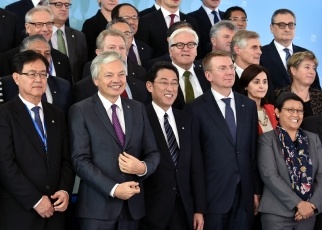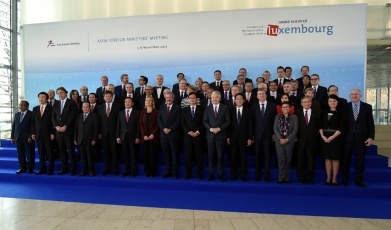The Asia-Europe Meeting (ASEM)
12th ASEM Foreign Ministers' Meeting (ASEM FMM12)


The 12th Asia-Europe Meeting (ASEM) Foreign Ministers’ Meeting (ASEM FMM12) was held in Luxembourg on November 5 and 6, and Mr. Fumio Kishida, Minister for Foreign Affairs of Japan, took part from Japan. The meeting brought together the foreign ministers, or their high-level representatives, of 51 countries and two organizations, and under the theme of “Working Together for a Sustainable and Secure Future” they exchanged views on “Climate Change, 2030 Agenda for Sustainable Development and Disaster Risk Reduction and Management” (Plenary Session 1), “Connectivity and the Future of ASEM” (Plenary Session 2), and “International and Regional Issues” (Retreat Session). The overview is as follows. In addition, with this meeting as an opportunity, Minister Kishida held a Japan-European Union (EU) Foreign Ministers’ Meeting, a Japan-Pakistan Foreign Ministers’ Meeting, a Japan-Luxembourg Foreign Ministers’ Meeting, a Japan-Germany Foreign Ministers’ Meeting, and a V4 (Hungary, Poland, the Czech Republic, and Slovakia) plus Japan Foreign Ministers’ Meeting.
1. “Climate Change, 2030 Agenda for Sustainable Development and Disaster Risk Reduction and Management” (Plenary Session 1)
(1) At the beginning, Ms. Federica Mogherini, the High Representative of the European Union (EU) for Foreign Affairs and Security Policy, Vice-President of the European Commission, who chaired the meeting, made introductory remarks. Following that, Minister Kishida, as the first lead speaker of the Plenary Session 1, pointed out in connection with responses to climate change that it is important to set long-term targets and include a regular review of emissions reduction targets in a new international framework to be established at the 21st Conference of the Parties (COP21), and to support developing countries. He also spoke about the need for the international community’s cooperation on steadily implementing the 2030 Agenda for Sustainable Development, and cooperation at the ASEM, such as sharing knowledge in the field of disaster risk reduction.
(2) In addition, including the above there were statements from a total of 27 countries and two organizations, and many countries noted that in the interests of a successful COP21, greater efforts towards an agreement that is ambitious and legally-binding are important, and developing countries in particular mentioned the importance of technical support and supplying funding in order to implement an agreement. Furthermore, many countries pointed out the relevance that exists between climate change, the 2030 Development Agenda, and disaster risk reduction. Asian countries, where natural disasters occur frequently, discussed the need to build capacity in order to have resilience to disasters, and implement the “Sendai Cooperation Initiative for Disaster Risk Reduction.”
2. “Connectivity and the Future of ASEM” (Plenary Session 2)
(1) At the beginning, High Representative Mogherini made introductory remarks, after which a total of 30 countries and one organization made statements. Many countries noted that connectivity is the embodiment of the ASEM’s cooperation, and is something that includes not just infrastructure and transportation but also broad-ranging concepts such as trade and investment, a digital element, people-to-people exchanges, education and culture. They suggested that cooperation should be given specific shape in the run up to the 20th anniversary of the founding of the ASEM next year. Additionally, several countries stated that the rule of law is also important from the standpoint of connectivity, mentioned dispute resolution through dialogue, and voiced concerns about the present situation in the South China Sea.
(2) In light of the fact that the ASEM is approaching its 20th anniversary, Japan commended the ASEM’s activities, and stated that it attaches importance to ASEM’s characteristic features as a framework for informal dialogue and cooperation. Additionally, after pointing out the importance of connectivity, Japan encouraged the promotion of cooperation especially in the field of tourism as one field of connectivity, and noted that the rule of law is also an important standpoint.
3. “International and Regional Issues” (retreat session)
(1) A discussion took place on the situation in the Middle East and North Africa, responses to terrorism and extremism, migration and refugees, and the regional security situation in Europe and Asia.
(2) Minister Kishida discussed initiatives for peace and stability in the Middle East, including stabilizing the situation in Syria, Japan’s humanitarian assistance and human resources and nation-building support as responses to terrorism and violent extremism, including the Islamic State of Iraq and the Levant (ISIL), cooperation on the migration and refugee issue, Japan’s position and support in relation to the Ukraine situation, the situation in the South China Sea and East China Sea, Japan’s concerns in regard to the issue of abductions by North Korea, and the necessity for the international community to make a concerted response based on the rule of law.
(3) In regard to the South China Sea, many countries expressed their concerns about the current situation, including large-scale land reclamation, and commented on the importance of the freedom of navigation and of resolving disputes based on international law. In addition, several countries mentioned North Korea’s nuclear programmes and its human rights situation.
(4) Many countries also commented on the Middle East situation and the refugee issue. In particular, they pointed out the need for ongoing efforts to stabilize the situation in the Middle East, urgent responses to the humanitarian situation facing refugees, and dialogue to deal with extremism.
Chair’s Statement of the 12th ASEM Foreign Ministers' Meeting -Working Together for a Sustainable and Secure Future- (PDF)

